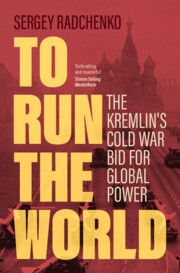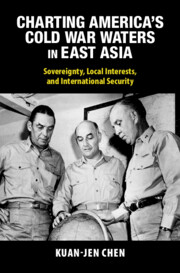495 results
9 - Rehabilitation
- from Part II - Living with the Bomb
-
- Book:
- Hitler's Atomic Bomb
- Print publication:
- 18 July 2024, pp 215-239
-
- Chapter
- Export citation
3 - Energy in the Cold War
-
- Book:
- Fuel and Power
- Print publication:
- 27 June 2024, pp 71-111
-
- Chapter
- Export citation
1 - Setting the Scene
-
- Book:
- Hydropower in Authoritarian Brazil
- Print publication:
- 27 June 2024, pp 15-45
-
- Chapter
- Export citation
6 - Trouble in the Horn and Soviet Encroachment
- from Part II - Forming an Africa Policy (1971–1975)
-
- Book:
- Pahlavi Iran's Relations with Africa
- Print publication:
- 27 June 2024, pp 150-174
-
- Chapter
- Export citation
10 - Southern Africa
- from Part III - Africa and Pahlavi Iran’s Grand Strategy (1976–1979)
-
- Book:
- Pahlavi Iran's Relations with Africa
- Print publication:
- 27 June 2024, pp 254-280
-
- Chapter
- Export citation
11 - Iran, the Ogaden War and African Security in the Late 1970s
- from Part III - Africa and Pahlavi Iran’s Grand Strategy (1976–1979)
-
- Book:
- Pahlavi Iran's Relations with Africa
- Print publication:
- 27 June 2024, pp 281-310
-
- Chapter
- Export citation
Chapter 23 - Great Games
- from Part IV - Anxious Neighbourhoods, Uncertain Futures
-
-
- Book:
- Europe in British Literature and Culture
- Print publication:
- 13 June 2024, pp 369-384
-
- Chapter
- Export citation
4 - Becoming Refugees, 1954–1960s
-
- Book:
- Migration at the End of Empire
- Published online:
- 30 May 2024
- Print publication:
- 06 June 2024, pp 176-222
-
- Chapter
- Export citation
Chapter 12 - Surrender and the Enduring Dangers of Yukikaze’s Haunt
-
- Book:
- Yukikaze's War
- Print publication:
- 06 June 2024, pp 254-280
-
- Chapter
- Export citation
6 - Queer Bonds of Cold War Sexuality
- from The Sexuality of American History
-
-
- Book:
- The Cambridge History of Queer American Literature
- Published online:
- 17 May 2024
- Print publication:
- 06 June 2024, pp 126-141
-
- Chapter
- Export citation
23 - The Oneiric Golden Age of Gay and Lesbian Pulp
- from Queer Genre
-
-
- Book:
- The Cambridge History of Queer American Literature
- Published online:
- 17 May 2024
- Print publication:
- 06 June 2024, pp 413-425
-
- Chapter
- Export citation
3 - Twice without a King
-
- Book:
- Migration at the End of Empire
- Published online:
- 30 May 2024
- Print publication:
- 06 June 2024, pp 131-175
-
- Chapter
- Export citation

To Run the World
- The Kremlin's Cold War Bid for Global Power
-
- Published online:
- 30 May 2024
- Print publication:
- 30 May 2024

Charting America's Cold War Waters in East Asia
- Sovereignty, Local Interests, and International Security
-
- Published online:
- 23 May 2024
- Print publication:
- 30 May 2024
5 - Capital and Claims-Making
- from Part II - International Advocacy
-
- Book:
- States-in-Waiting
- Published online:
- 09 May 2024
- Print publication:
- 16 May 2024, pp 143-172
-
- Chapter
-
- You have access
- Open access
- HTML
- Export citation
The “Other” Pro-Israel Lobby: The AFL-CIO and Israel (1952–1960)
-
- Journal:
- Modern American History , FirstView
- Published online by Cambridge University Press:
- 16 May 2024, pp. 1-24
-
- Article
-
- You have access
- Open access
- HTML
- Export citation
13 - The Sexual Revolution
-
-
- Book:
- The Cambridge World History of Sexualities
- Published online:
- 26 April 2024
- Print publication:
- 16 May 2024, pp 275-296
-
- Chapter
- Export citation
Cold War Austria and Migration from Eastern Europe: Refugees and Labor Migrants
-
- Journal:
- Austrian History Yearbook , First View
- Published online by Cambridge University Press:
- 10 May 2024, pp. 1-9
-
- Article
-
- You have access
- HTML
- Export citation
11 - Australia and China, 1991–95: Asymmetry and Congruence in the Post–Cold War Era
-
-
- Book:
- Australia in World Affairs 1991–1995
- Published online:
- 04 May 2024, pp 123-137
-
- Chapter
- Export citation
5 - Australia’s Defence Policies in the Post–Cold War Era
-
-
- Book:
- Australia in World Affairs 1991–1995
- Published online:
- 04 May 2024, pp 44-55
-
- Chapter
- Export citation



